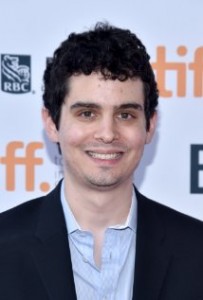My husband and I loved it. His mother hated it. A provocative, at times terrifying piece of filmmaking, you don’t have to like it to recognize the quality of Damien Chazelle‘s Oscar winning film, Whiplash:
BLACK…
We hear a HIT. A drumstick against a drum head. Crisp, sharp. Then a second hit. Then a third and a fourth. The hits growing so fast they start to blur together. Like gunfire…
INT. NASSAU BAND REHEARSAL STUDIO – GEHRING HALL – NIGHT
A cavernous space. Sound-proofed walls. And in the center, a DRUM SET. Seated at it, in a sweat-marked white T, eyes zeroed on his single-stroke roll, is ANDREW NEIMAN. He’s 19, slight, honors-student-skinny — except for his arms, which have been built from years and years of drumming. Suddenly — a MAN enters the practice room. Stopping, rising–
ANDREW
Sorry… I’m — I’m sorry–
MAN
It’s ok. Stay there.
The MAN steps forward, removes his coat. He’s tall. Late fifties. Black T-shirt, black slacks, black shoes. We’ll know him as FLETCHER. The room is silent now. And then, softly, as he’s one of those people whose whisper can scare the crap out of you–
FLETCHER
What’s your name?
ANDREW
Andrew Neiman, sir.
(It’s pronounced “Nayman”.)
FLETCHER
What year are you?
ANDREW
I’m a first-year, sir.
FLETCHER
You know who I am?
ANDREW
Yes…
FLETCHER
You know what I do?
ANDREW
Yes…
FLETCHER
So you know I’m looking for players.
ANDREW
Yes…
FLETCHER
Then why did you stop playing?
Beat. Andrew nods, smiles. He gets it. Summons up all his remaining energy and resumes playing, trying to really show off this time. Rolls, fills, speedy stick-work. He finishes.
FLETCHER (CONT’D)
Did I say to start playing again?
Andrew looks at him.
ANDREW
I thought– (then, blanching,) I’m sorry, I misun–
FLETCHER
I asked you why you stopped playing. Your version of
an answer was to turn into a wind-up drummer monkey.
ANDREW
I’m sorry — I–I stopped playing becau–
FLETCHER
Show me your rudiments.
Andrew nods. Plays one rudiment after another: double-stroke roll, paradiddle, ratamacue, flam, flamadiddle.
FLETCHER (CONT’D)
Uh-huh. Double-time swing.
Fletcher begins clapping his hand in time. Fast. Andrew plays.
FLETCHER (CONT’D)
No. Double-time. Double it.
Bop-bop-bopbop-bop-bop-bop-bop-bop-bop.
Andrew tries doubling the tempo. But he can’t. Fletcher STOPS CLAPPING. The sign of death. Andrew keeps playing, eyes shut… Then — he hears the door CLOSE. He stops, and looks up. Fletcher has left the room. A moment later — the door OPENS. It’s Fletcher. Andrew’s eyes widen. Maybe it’s not over…
FLETCHER (CONT’D)
Woopsy-daisy. Forgot my coat.
Fletcher grabs it, steps back out, CLOSES the door. Andrew stares ahead, alone again at the drums — and totally deflated.
It’s over.
These first three pages of Chazelle’s script are not in the attached short video, because Chazelle didn’t write a short. He wrote a feature length script first that made it onto the 2012 Black List; the coveted list of Hollywood agents and execs favorite unproduced scripts. A spot on the Black List can catapult writers into a career in screenwriting; maybe even an Oscar (Diablo Cody for Juno). In Chazelle’s case, it brought him to the attention of producers Jason Blum and Helen Estabrook who gave him excellent advice: make your long story short.
In order to secure financing for his feature film, Chazelle (who also directed) chose one scene from his feature length script and filmed a short that went on to win at 2013 Sundance. That win got him the three million in financing to shoot the feature, which went on to win at 2014 Sundance and the 2015 Academy Awards.
Why does information about Whiplash matter to you, the writer of a short script?
The short answer is that Damien Chazelle’s story should give all struggling screenwriters hope. There is a path to get from here to there, whether you are writing shorts that you hope get made into features, or writing features that get made into shorts (and then features!). But a great story alone may not get you there. Indiewire interviewed producers Helen Estabrook and Jason Blum about their experience on making the film and working with Chazelle:
“He has a clarity of vision, and he has this incredible vocabulary in being able to communicate his ideas.” – Helen Estabrook
FiLMLaB is no substitute for Film School. But it does offer writers an opportunity to step up their game and begin a conversation in the process of filmmaking; a chance to learn more of the vocabulary necessary to communicate your script ideas. It offers a brief education in low budget movie making and exposure to the kind of discipline and preparedness every writer can benefit from.
The full Indiewire article can be viewed here.

